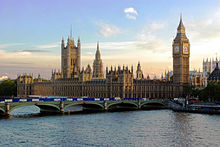
Parliament of the United Kingdom
Legislative body in the United Kingdom / From Wikipedia, the free encyclopedia
Dear Wikiwand AI, let's keep it short by simply answering these key questions:
Can you list the top facts and stats about Parliament of the United Kingdom?
Summarize this article for a 10 year old
The Parliament of the United Kingdom of Great Britain and Northern Ireland[lower-alpha 6] is the supreme legislative body[lower-alpha 7] of the United Kingdom, and may also legislate for the Crown Dependencies and the British Overseas Territories.[4][5] It meets at the Palace of Westminster in London. Parliament possesses legislative supremacy and thereby holds ultimate power over all other political bodies in the United Kingdom and the Overseas Territories. While Parliament is bicameral, it has three parts: the sovereign, the House of Lords, and the House of Commons.[6] The three parts acting together to legislate may be described as the King-in-Parliament.[7] The Crown normally acts on the advice of the prime minister, and the powers of the House of Lords are limited to only delaying legislation.[8]
This article needs additional citations for verification. (December 2023) |
The House of Commons is the elected lower chamber of Parliament, with elections to 650 single-member constituencies held at least every five years under the first-past-the-post system.[9] By constitutional convention, all government ministers, including the prime minister, are members of the House of Commons (MPs), or less commonly the House of Lords, and are thereby accountable to the respective branches of the legislature. Most Cabinet ministers are from the Commons, while junior ministers can be from either house.
The House of Lords is the upper chamber of Parliament,[10] comprising two types of members. The most numerous are the Lords Temporal, consisting mainly of life peers appointed by the sovereign on the advice of the prime minister,[11] plus up to 92 hereditary peers. The less numerous Lords Spiritual consist of up to 26 bishops of the Church of England. Before the establishment of the Supreme Court of the United Kingdom in 2009, the House of Lords performed judicial functions through the law lords.
The Parliament of the United Kingdom is one of the oldest legislatures in the world, and is characterised by the stability of its governing institutions and its capacity to absorb change.[12] The Westminster system shaped the political systems of the nations once ruled by the British Empire, and thus has been called the "mother of parliaments".[13][lower-alpha 8]



